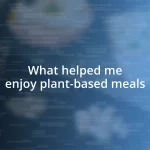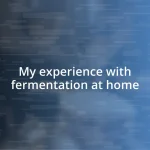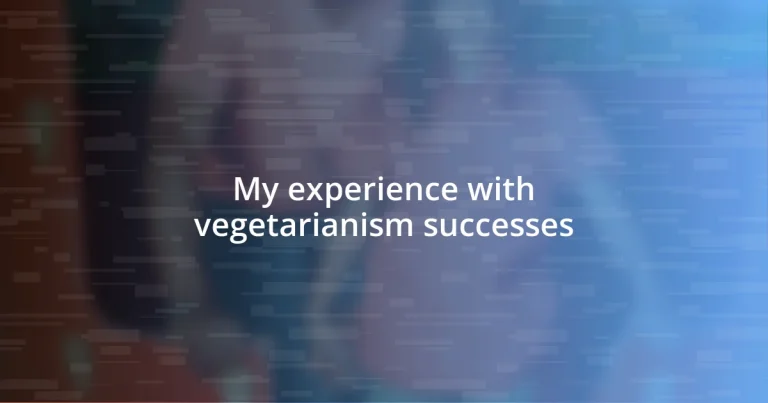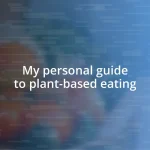Key takeaways:
- Vegetarianism is driven by ethical, environmental, and health motivations, leading to a deepened connection with food.
- Overcoming initial challenges, such as social settings and cravings, can enhance the vegetarian experience through preparation and exploration.
- Meal planning, community support, and trying new recipes are crucial for long-term success in maintaining a vegetarian lifestyle.
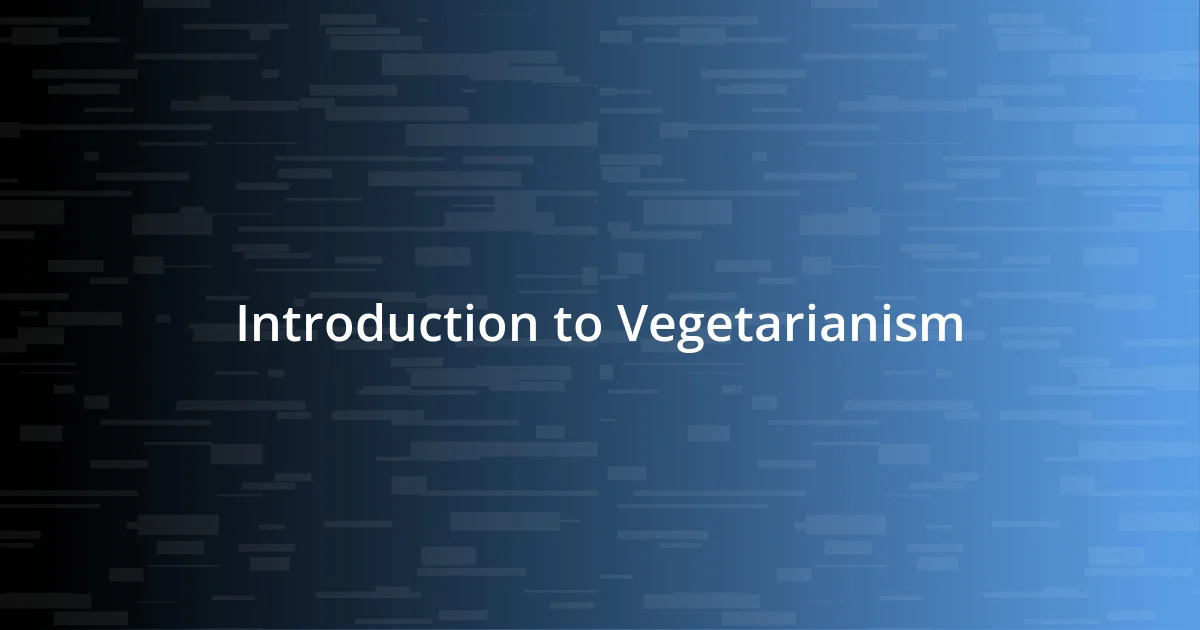
Introduction to Vegetarianism
Vegetarianism, at its core, is a lifestyle choice that revolves around abstaining from meat consumption. I remember the first time I consciously made the decision to go vegetarian; it was both exhilarating and daunting. I found myself contemplating not just what I would eat, but the ethical implications and health benefits that came along with this new journey.
Many people choose vegetarianism for various reasons, including ethical beliefs, environmental concerns, and health benefits. Personally, the idea of contributing to a more sustainable planet resonated deeply with me. Have you ever thought about the impact of your food choices? For me, choosing plant-based meals was not just a diet change; it was a chance to align my eating habits with my values.
As I embraced vegetarianism, I noticed a shift in my connection with food. It encouraged me to explore a world filled with diverse flavors and ingredients I had previously overlooked. What started as a simple dietary choice transformed into an enriching experience that changed the way I viewed nutrition and cooking.
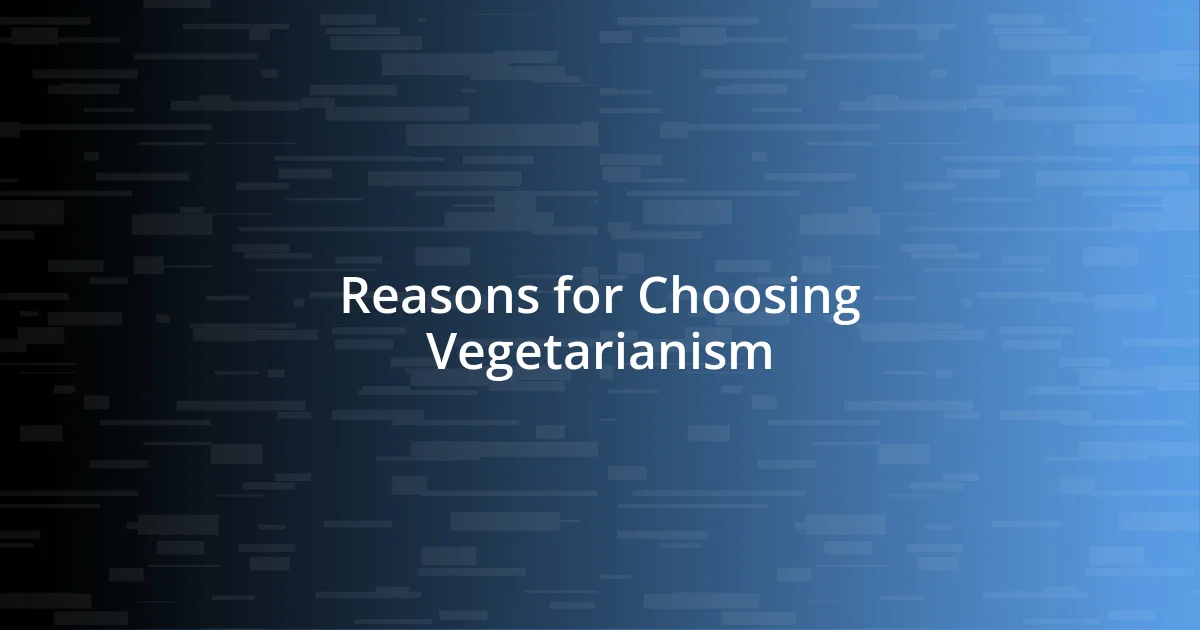
Reasons for Choosing Vegetarianism
Choosing vegetarianism is often prompted by a combination of ethical and environmental motivations. For me, the realization that meat production significantly contributes to greenhouse gas emissions was an eye-opener. I still vividly remember reading about how livestock farming uses immense water resources; it pushed me to reconsider my choices.
Additionally, many people, myself included, have experienced notable health benefits from adopting a vegetarian diet. I remember the first few weeks of my transition; my energy levels soared, and I felt lighter both physically and mentally. Sharing meals rich in fruits and vegetables not only nourished my body but also fostered a deeper connection with my food and those I shared it with.
Lastly, the sense of community found among fellow vegetarians can be a powerful motivator. The friendships I’ve formed through cooking classes and online forums have enriched my culinary journey. We often exchange recipes and tips, making the transition feel less isolating—it’s inspiring to be part of a movement that aligns with my values and health aspirations.
| Reason | Personal Experience |
|---|---|
| Ethical beliefs | Realizing meat production’s environmental impact |
| Health benefits | Feeling revitalized after adopting a plant-based diet |
| Community and support | Building friendships through shared values and experiences |

Initial Challenges and How I Overcame Them
As I embarked on my vegetarian journey, I encountered several initial hurdles that tested my resolve. The biggest challenge, I’d say, was navigating social situations—family gatherings and restaurants often felt daunting. I can still recall attending a friend’s barbecue, where the only options for me seemed to be bland sides. However, I overcame this by preparing a delicious veggie dish to share and asking the host in advance if they could accommodate my dietary choices. This not only made me feel included but also sparked conversations about vegetarianism!
To give you a clearer picture, here’s a list of my initial challenges and how I tackled them:
-
Social Settings: Felt out of place at gatherings.
Solution: Brought my own dish and shared it, creating a tasty conversation starter. -
Lack of Meal Variety: Struggled with repetitive meals.
Solution: I made it a goal to try a new recipe every week, expanding my culinary repertoire. -
Cravings for Meat: Faced intense cravings initially.
Solution: Switched to plant-based meat alternatives, which satisfied my taste buds without compromising my values.
Exploring grocery stores was another eye-opener! I often felt overwhelmed by the plethora of unfamiliar ingredients. I remember standing in the produce section, unsure of how to select or use items like kale and quinoa. Instead of getting frustrated, I began experimenting in the kitchen, turning this challenge into an adventure. Each new ingredient that I confidently prepared became a small victory in my journey.
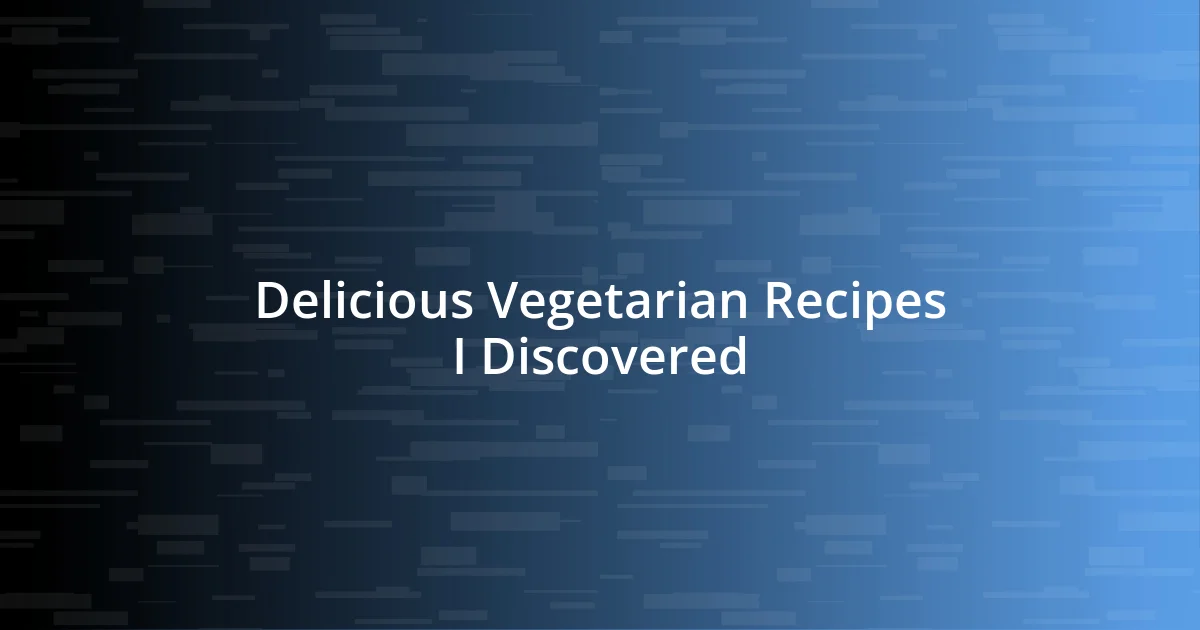
Delicious Vegetarian Recipes I Discovered
One of my favorite discoveries has been a spicy lentil stew that warms both the heart and the soul. I remember the first time I made it; the aroma of cumin and coriander filled my kitchen, inviting everyone to gather around. The best part? It’s packed with protein and fiber, making it not just delicious, but nourishing too. Have you ever had a meal that felt like a hug? This stew does that for me every time.
Another standout recipe has been a roasted vegetable quinoa salad. The vibrant colors of the vegetables made it visually appealing, but what truly blew my mind were the bursting flavors. I still smile recalling the first time I served it at a potluck. Everyone was intrigued, and I loved sharing how simple it was to create such a hearty dish. Quinoa, a tiny grain packed with nutrients, pairs perfectly with roasted zucchini and bell peppers—have you tried experimenting with different combinations?
Finally, I stumbled upon a creamy avocado pasta that changed the way I viewed comfort food. Instead of relying on dairy for that satisfying richness, blending ripe avocados with lemon juice and garlic created an indulgent sauce that left me wanting more. I distinctly recall indulging in leftovers the next day, savoring each bite just as much as the first. It’s remarkable how vegetarian cuisine can satisfy cravings and ignite creativity—don’t you think?
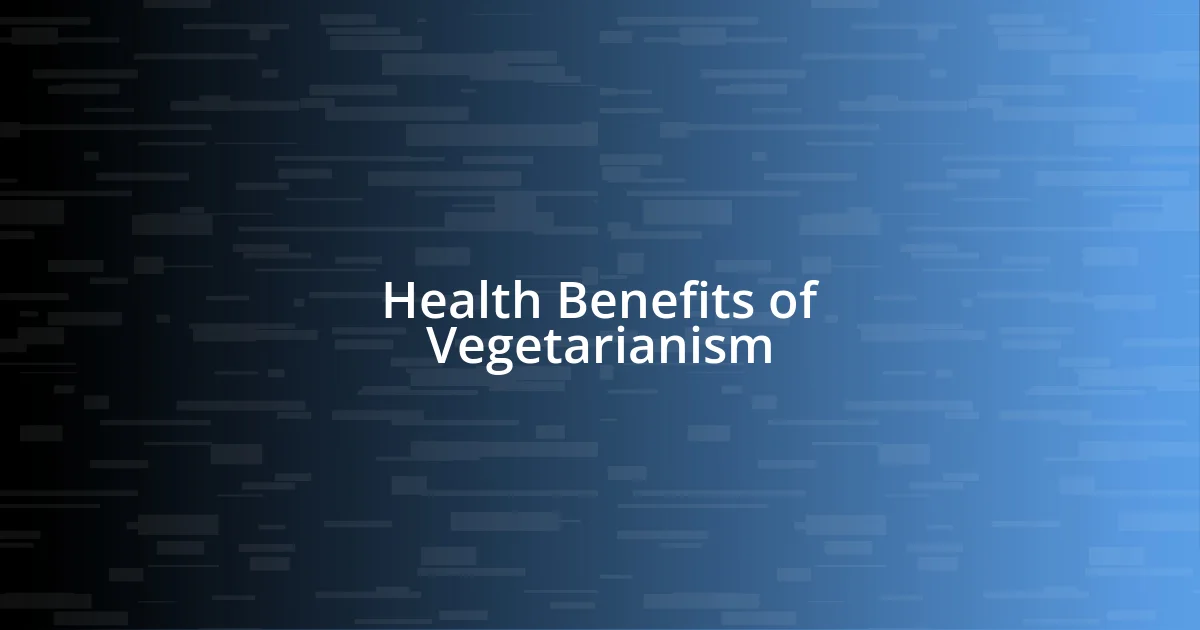
Health Benefits of Vegetarianism
The health benefits of vegetarianism have been truly transformative for me. One of the first things I noticed was an increase in my energy levels. I used to feel sluggish after a heavy meal, but since I cut out meat, I often feel light and agile after eating. Have you considered how your body reacts to different foods? It’s quite fascinating how plants can fuel us more efficiently.
I also experienced significant improvements in my digestion. Transitioning to a diet rich in fruits, vegetables, and whole grains meant I consumed more fiber. I still remember the first few weeks of this change; it was a bit awkward at times, but feeling lighter and more regular was a small price to pay for such a substantial benefit. Doesn’t it feel good when our bodies respond positively to what we eat?
Another remarkable change has been my skin’s health. I’ve dealt with occasional breakouts for years, but since adopting a vegetarian lifestyle, my complexion has cleared—even my friends have commented on it! It’s amazing how the right nutrients can radiate through your skin. I often wonder, could the food we choose really affect how we feel about ourselves? It certainly has for me.
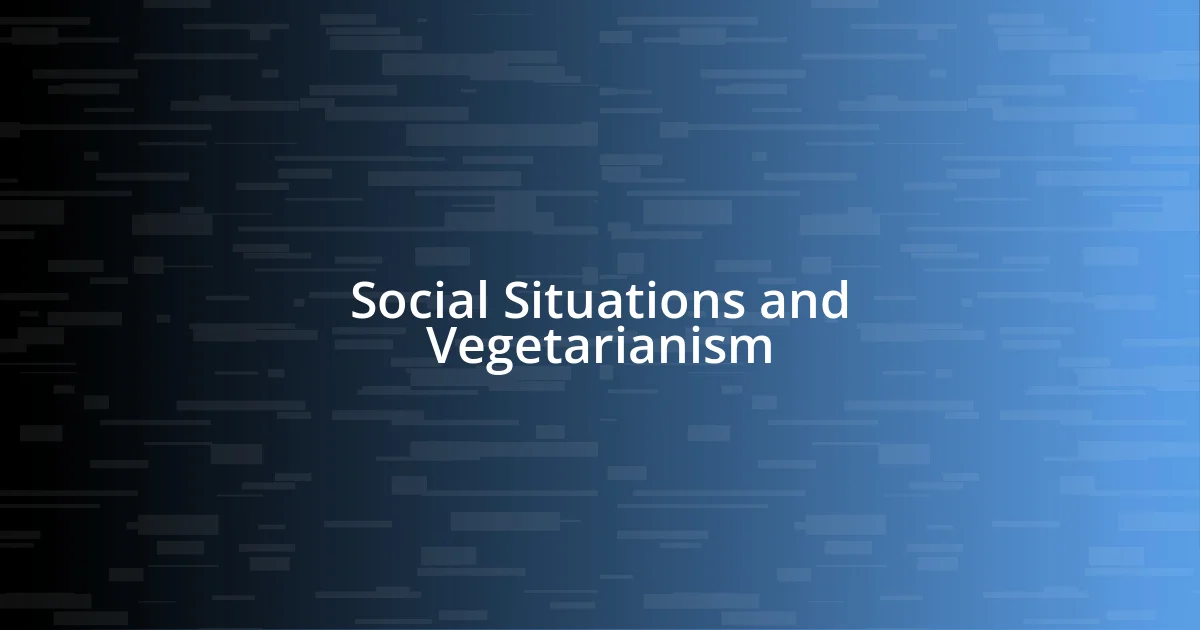
Social Situations and Vegetarianism
Social gatherings can sometimes feel like a minefield for a vegetarian. I remember attending a barbecue and finding myself surrounded by sizzling burgers and hot dogs. While I appreciated the effort my friends made to include a few sides, I couldn’t help but feel a bit left out. Have you ever felt that way? It made me appreciate the importance of communicating my dietary needs ahead of time, as it not only eases my own experience but also encourages others to explore vegetarian options.
I’ve also had to navigate holiday celebrations where traditional dishes are the star of the show. One Thanksgiving, I brought my own stuffed squash, which was met with a mix of curiosity and enthusiasm. The joy on my family’s faces when they tasted it felt rewarding. Isn’t it wonderful how food can bring us together? Sharing unique vegetarian dishes often opens doors to vibrant conversations about food choices and health, transforming what might have been awkward moments into engaging discussions.
In my journey, I’ve found that educating those around me about vegetarianism can turn potential awkwardness into connection. Just last week, during a dinner, my friend asked why I chose this lifestyle. This led to a lively discussion about sustainability, health benefits, and ethical considerations around food—even inspiring them to try meat-free meals more regularly. Isn’t it amazing how sharing personal experiences can create understanding and even influence others positively? Every social situation has the potential to be a platform for growth and awareness.
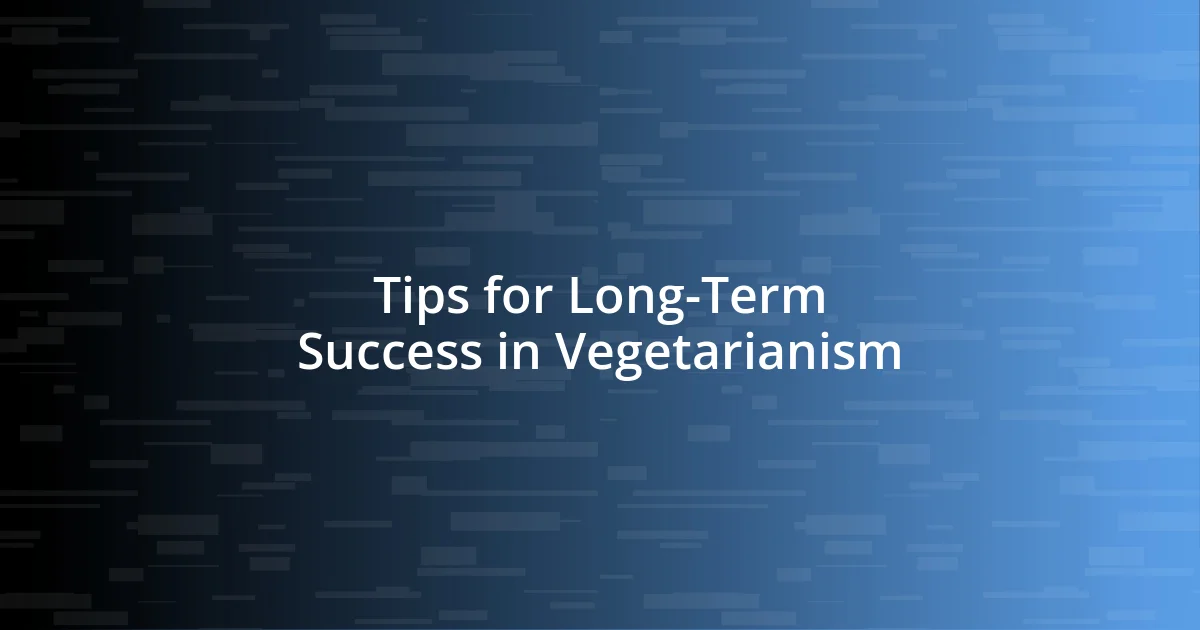
Tips for Long-Term Success in Vegetarianism
One of the most effective strategies I’ve found for long-term success in vegetarianism is meal planning. I remember a particularly hectic week when I didn’t have any meals prepared; I ended up snacking on whatever was easiest. That experience taught me the value of setting aside a couple of hours each week to plan and prepare my meals. Have you tried this? It truly makes sticking to a vegetarian diet much easier and keeps the cravings for non-vegetarian options at bay.
Equally important is finding a supportive community. I joined an online vegetarian group after realizing that sharing experiences made me feel more connected. I often find inspiration in the delicious recipes and success stories shared by others. It’s comforting to know that I’m not alone on this journey. Have you had a chance to connect with like-minded individuals? Sometimes, knowing others face similar challenges can make all the difference in staying motivated.
Another tip I cherish is continually exploring new foods and recipes. There’s so much variety in plant-based cooking! One weekend, I decided to experiment with a cuisine I’d never tried before—Indian cooking. I was amazed at how many delightful vegetarian options existed, from fragrant curries to innovative lentil dishes. Have you ever ventured out of your comfort zone with food? Trying new flavors and textures not only expands your palate but makes the vegetarian journey an exciting adventure.





